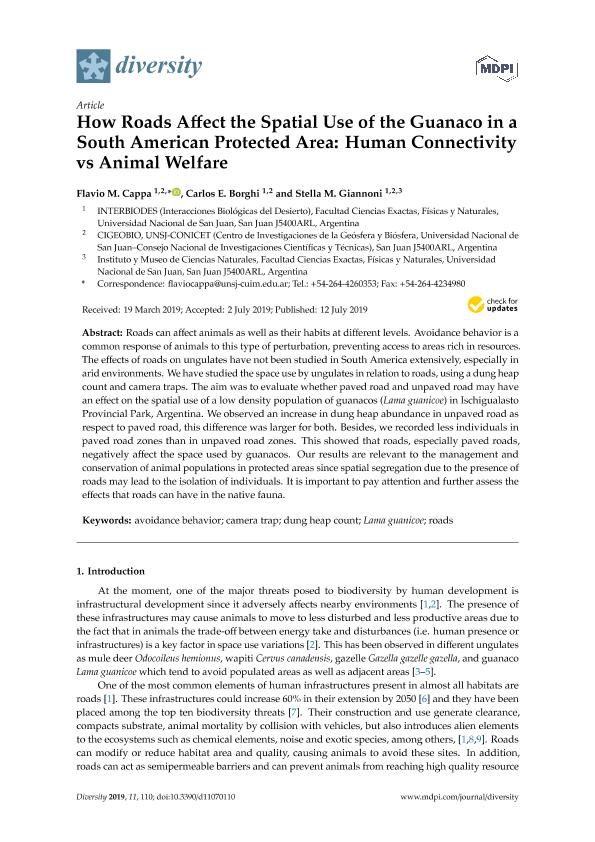Artículo
How Roads Affect the Spatial Use of the Guanaco in a South American Protected Area: Human Connectivity vs Animal Welfare
Fecha de publicación:
07/2019
Editorial:
Molecular Diversity Preservation International
Revista:
Diversity
ISSN:
1424-2818
Idioma:
Inglés
Tipo de recurso:
Artículo publicado
Clasificación temática:
Resumen
Roads can affect animals as well as their habits at different levels. Avoidance behavior is a common response of animals to this type of perturbation, preventing access to areas rich in resources. The effects of roads on ungulates have not been studied in South America extensively, especially in arid environments. We have studied the space use by ungulates in relation to roads, using a dung heap count and camera traps. The aim was to evaluate whether paved road and unpaved road may have an effect on the spatial use of a low density population of guanacos (Lama guanicoe) in Ischigualasto Provincial Park, Argentina. We observed an increase in dung heap abundance in unpaved road asrespect to paved road, this difference was larger for both. Besides, we recorded less individuals in paved road zones than in unpaved road zones. This showed that roads, especially paved roads, negatively affect the space used by guanacos. Our results are relevant to the management and conservation of animal populations in protected areas since spatial segregation due to the presence ofroads may lead to the isolation of individuals. It is important to pay attention and further assess the effects that roads can have in the native fauna.
Palabras clave:
AVOIDANCE BEHAVIOR
,
CAMERA TRAP
,
DUNG HEAP COUNT
,
LAMA GUANICOE
,
ROADS
Archivos asociados
Licencia
Identificadores
Colecciones
Articulos(CIGEOBIO)
Articulos de CENTRO DE INVESTIGACIONES DE LA GEOSFERA Y BIOSFERA
Articulos de CENTRO DE INVESTIGACIONES DE LA GEOSFERA Y BIOSFERA
Citación
Cappa, Flavio Martín; Borghi, Carlos Eduardo; Giannoni, Stella Maris; How Roads Affect the Spatial Use of the Guanaco in a South American Protected Area: Human Connectivity vs Animal Welfare; Molecular Diversity Preservation International; Diversity; 11; 7; 7-2019
Compartir
Altmétricas




